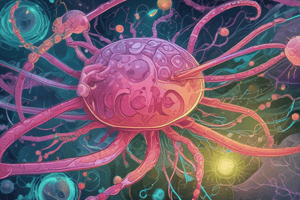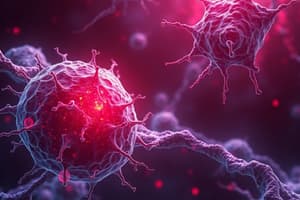Podcast
Questions and Answers
What is the primary characteristic that differentiates cancerous cells from normal cells?
What is the primary characteristic that differentiates cancerous cells from normal cells?
- Cancerous cells are specialized for their jobs.
- Cancerous cells divide uncontrollably. (correct)
- Cancerous cells perform a variety of functions.
- Cancerous cells follow the rules of contact inhibition.
What term describes the tendency of cells to not divide when closely surrounded by other cells?
What term describes the tendency of cells to not divide when closely surrounded by other cells?
- Contact Inhibition of Reproduction (correct)
- Contact Inhibition of Movement
- Metastasis
- Cellular Senescence
Which type of tumor is considered harmful and can spread throughout the body?
Which type of tumor is considered harmful and can spread throughout the body?
- Benign tumors
- Non-cancerous growths
- Calluses
- Malignant tumors (correct)
Which category of cancer affects skin and nerve tissues?
Which category of cancer affects skin and nerve tissues?
What is the primary reason cells undergo cellular senescence?
What is the primary reason cells undergo cellular senescence?
What is the term for the process by which cancerous cells spread from their original site?
What is the term for the process by which cancerous cells spread from their original site?
Which of the following statements about benign tumors is true?
Which of the following statements about benign tumors is true?
Which of the following is a characteristic of cancerous cells compared to normal cells?
Which of the following is a characteristic of cancerous cells compared to normal cells?
What is the main purpose of checking lymph nodes for cancer cells?
What is the main purpose of checking lymph nodes for cancer cells?
Which of the following is NOT considered a carcinogen?
Which of the following is NOT considered a carcinogen?
What effect do viral agents like Human Papilloma Virus (HPV) have related to cancer?
What effect do viral agents like Human Papilloma Virus (HPV) have related to cancer?
How do oncogenes differ from proto-oncogenes?
How do oncogenes differ from proto-oncogenes?
Which treatment plan would most likely be used if there is evidence of cancer metastasis?
Which treatment plan would most likely be used if there is evidence of cancer metastasis?
Which of the following statements is true regarding chemotherapy?
Which of the following statements is true regarding chemotherapy?
What do the terms 'metastasis' and 'aggressive' in cancer treatment imply?
What do the terms 'metastasis' and 'aggressive' in cancer treatment imply?
What is the primary goal of surgical removal in cancer treatment?
What is the primary goal of surgical removal in cancer treatment?
Flashcards
Carcinogens
Carcinogens
Substances or energy sources that cause cancer by damaging DNA and triggering uncontrolled cell growth.
Viral Agents
Viral Agents
Viruses that can cause mutations within the cells they infect, increasing the risk of cancer.
Oncogenes
Oncogenes
Genes that promote cell growth and division. When mutated, they can cause cancer.
Proto-oncogenes
Proto-oncogenes
Signup and view all the flashcards
Surgical Removal
Surgical Removal
Signup and view all the flashcards
Radiation Therapy
Radiation Therapy
Signup and view all the flashcards
Chemotherapy
Chemotherapy
Signup and view all the flashcards
Metastasis
Metastasis
Signup and view all the flashcards
Contact Inhibition
Contact Inhibition
Signup and view all the flashcards
Cellular Senescence
Cellular Senescence
Signup and view all the flashcards
Tumor
Tumor
Signup and view all the flashcards
Benign Tumor
Benign Tumor
Signup and view all the flashcards
Malignant Tumor
Malignant Tumor
Signup and view all the flashcards
Carcinoma
Carcinoma
Signup and view all the flashcards
Leukemia
Leukemia
Signup and view all the flashcards
Study Notes
Cancer Overview
- Cancer involves abnormal cell growth and reproduction.
- Normal cells have specialized functions and obey rules for growth, reproduction, and location.
- Cancerous cells ignore these rules, leading to rapid division and tumor formation.
Cell Behavior and Cancer
- Contact Inhibition: Normal cells stop dividing when they come into contact with other cells (preventing overcrowding).
- Contact Inhibition of Movement: Normal cells maintain their position within tissues.
- Contact Inhibition of Reproduction: Normal cells avoid dividing when there's no room.
- Cellular Senescence: As a cell divides, its descendants have reduced ability to divide.
- Cancer cells ignore these constraints, leading to uncontrolled growth.
Tumor Types
- Not all tumors are cancerous. Benign tumors are non-cancerous.
- Calluses, moles, and other similar growths are benign.
- Cancerous tumors are called malignant.
- Malignant tumors are classified according to the tissue type they affect:
- Carcinomas: Skin and nerve tissues
- Sarcomas: Bone and muscle tissues
- Lymphomas: Solid tumors in blood-forming and lymphatic tissues
- Leukemia: Cancers within white blood cells
Metastasis
- Metastasis: The spread of cancer cells throughout the body.
- Cancer cells often travel through lymphatic fluids.
- Lymph nodes are frequently checked for cancer cells.
Cancer Causes
- Carcinogens: Substances that damage DNA and cause mutations, leading to cancer. Examples include asbestos, UV light, benzene, tobacco, DDT, and radiation.
- Viral Agents: Certain viruses can cause mutations in infected cells.
- Human Papillomavirus (HPV): Associated with increased risk of uterine and other reproductive cancers.
- Hepatitis Viruses (especially Hepatitis C): Associated with increased risk of liver cancer.
- Cancer Genes:
- Oncogenes: Genes that, when mutated, can cause uncontrolled cell growth
- Proto-oncogenes: Normal genes that promote cell growth and division. These genes can be mutated and become oncogenes
Cancer Treatment
- Cancer treatments aim to destroy cancerous cells.
- Surgical removal: Directly removing cancerous tissue.
- Radiation therapy: Using high-energy radiation to kill cancer cells.
- Chemotherapy: Using powerful drugs to kill cancer cells. More toxic to cancer cells, than normal cells, due to different metabolic rates.. It is generally used to treat advanced or aggressive cancers.
Studying That Suits You
Use AI to generate personalized quizzes and flashcards to suit your learning preferences.





